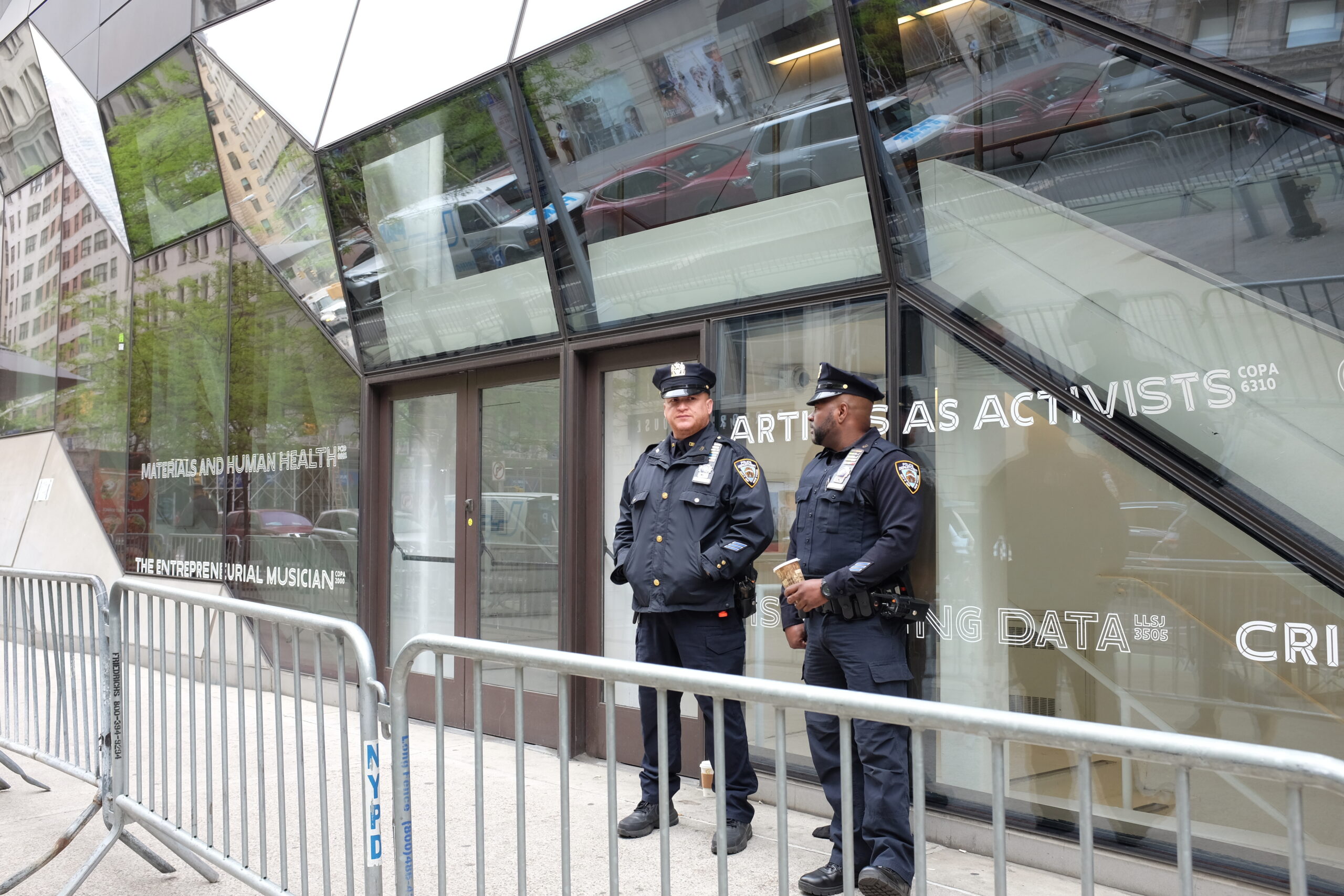Zoe Hussain, the Managing Editor of News and Opinion, responds to the arrest of members of The New School’s Gaza Solidarity Encampment and protecting free speech.
If you’ve walked by The New School’s campus the past few days, you might’ve noticed New York Police Department officers outside our University Center, Parsons School of Design, and other adjacent buildings. What you may have also noticed is the white text scattered on the outside walls of our UC, that read the names of our course offerings such as “Sociology of Fascism,” “Boundaries and Belongings,” or “Radical Democracy.”
This stark image, of the very same police force that arrested members of our student body while they were protesting Israel’s war on Gaza and calling for divestment, standing in front of such a public symbol of our institution’s so-called progressive values, is entirely emblematic of the conflict our community now faces.
Regardless of where our community members stand on the issue of boycotting, divestment, and sanctions, we have a crisis of free speech and protest on our college campuses. The arrest of members of the Gaza Solidarity Encampment begs the question: How do we recover our progressive legacy? Did we ever really have one?
As a reporter and editor at the New School Free Press, I have witnessed both the internal and external conflicts our administration has faced in responding to student activism in support of Palestine. I have also witnessed the strife students have faced in the recent weeks and the heartbreak and shock on the faces of our community members at One Police Plaza last Friday.
In the many messages “puppeted” between university leaders and the student body, there exists a difference in understanding of what it means to protest. A difference that is reflective of a historical struggle between activism and administrative values at TNS.
The founders of The New School — Charles Beard, John Dewey, James Harvey Robinson, and Thorstein Veblen — established our university to exist outside the hegemony of traditional academia. While teaching at Columbia, they were censured for protesting the United States’ entry into the First World War, and founded TNS as a place for academics and activists who expressed dissent at the “status quo.” It was also a safe haven for refugees in Nazi Germany in the 1930s and a place for new thinkers to challenge academic orthodoxy.
Our university additionally has a history of protests that the administration responds to with police action. In 1970, after the United States expansion of the Vietnam War into Cambodia and the killing of four students at Kent State University by the Ohio National Guard, student demonstrators from The New School’s Graduate Center occupied buildings and organized rallies in protest. After a three-week sit-in, they were eventually met with police action and charged with criminal trespassing.
The old adage that history repeats itself has once again become relevant as we navigate what it means to be a progressive university in an age where freedom of speech and the press are under threat and not entirely protected under the policies of private universities.
Essentially, we are faced with the question of what it means to be “New” when our problems are old.
In TNS professor Julia Foulkes’s essay, “What It Means to Be a Progressive University,” she writes of the elusive idea of James Baldwin as a TNS student. From all that is evidenced, Baldwin took one acting class at TNS in 1914. TNS’s posthumous contortion of Baldwin’s legacy to create an iconoclastic progressive image demonstrates an administrative reliance on the groundbreaking work of its scholars — who are often transient — instead of a true commitment to the values these scholars fought for.
To recover our original dedication to dissent and equity, our university must embrace the guardrails established by the American Civil Liberties Union (ACLU) to ensure academic freedom while protecting students against discriminatory harassment. Only then can we truly mark ourselves as a progressive university.
In their Open Letter to College and University Presidents on Student Protests, the ACLU recommends that universities not single out particular viewpoints for censorship and discipline. They also mention that while universities can technically establish “time, manner, and place” rules for protests, they must leave “ample room for students to express themselves” and place restrictions that are content-neutral.
Further, and most importantly, armed police on campus must only be used as a last resort if every other measure has been exercised. The arrests made last Friday did not meet these parameters and the removal and arrest of people from the Gaza Solidarity Encampment, while members were sleeping, demonstrates a tactical and non-communicative approach to negotiations.
The presence of Special Response Group (SRG) officers and the continued presence of NYPD on campus also stands in staunch opposition to our institution’s touted values of racial equity. The university must be cognizant of the historical use of law enforcement to intimidate and disproportionately harm Black, brown, and immigrant students.
I enrolled in this university shortly after Black Lives Matter protests gripped the nation. In organizing, I found my love for journalism. It was evident to me that there was a need for truth to foster understanding and hold both institutions and individuals accountable for the public good. I understand that my enterprise would not exist without the First Amendment rights that protect activists — efforts that similarly allow people to expose their truth and disrupt the status quo.
I ask community members and the administration, regardless of your stance on the content of continued demonstrations, to understand your positionality in times as pivotal as these. The old “New” has the potential to be unwritten — but only if we establish what it means to be a “progressive” university once and for all.







